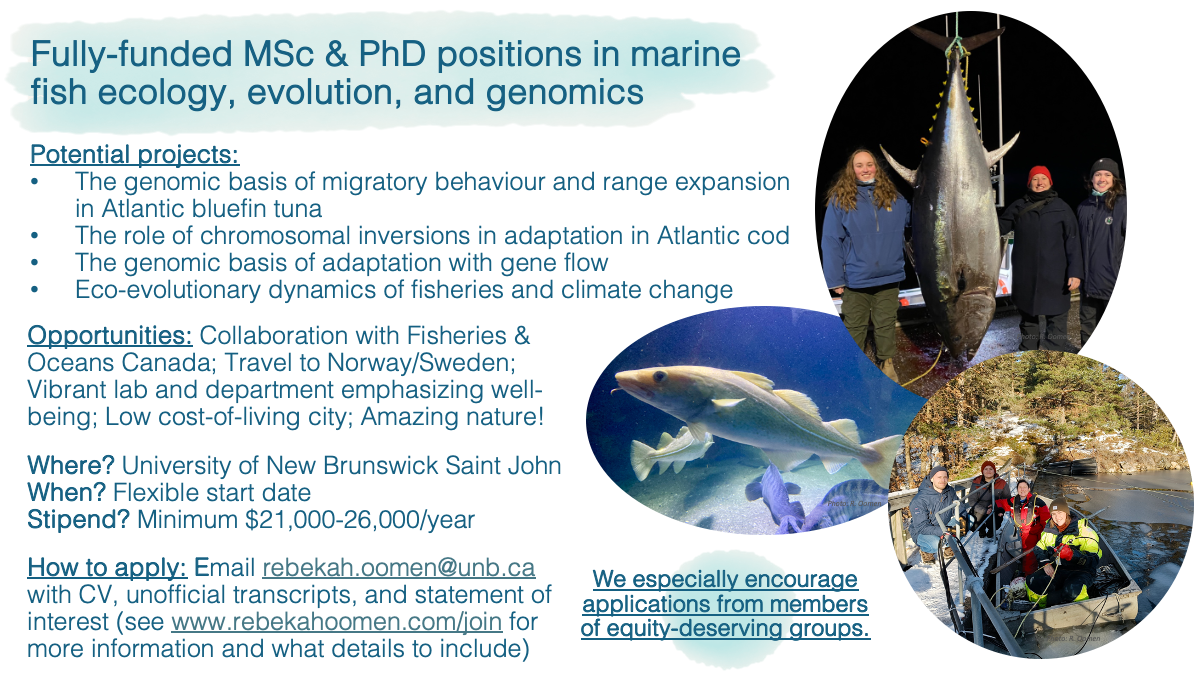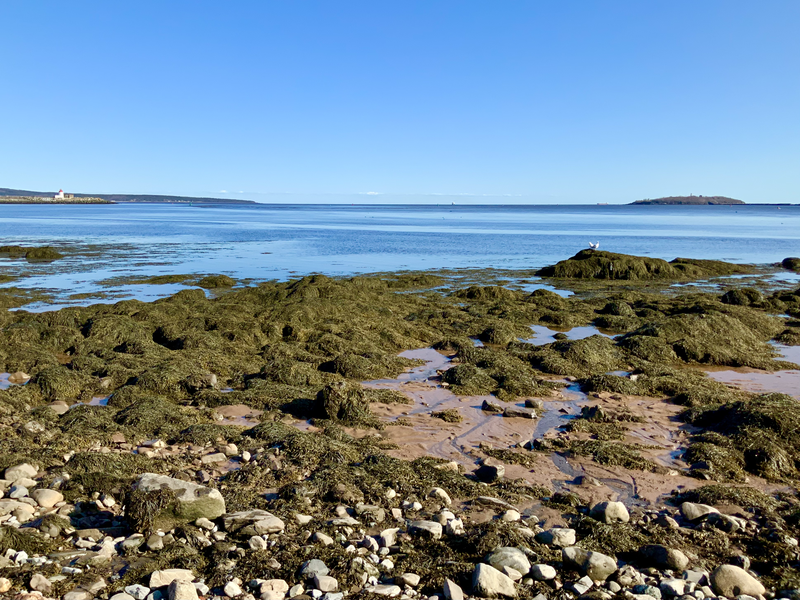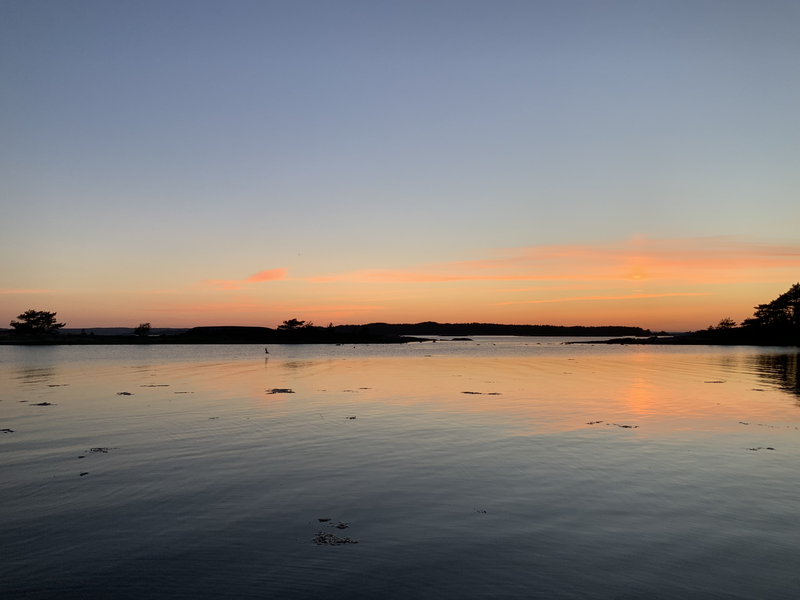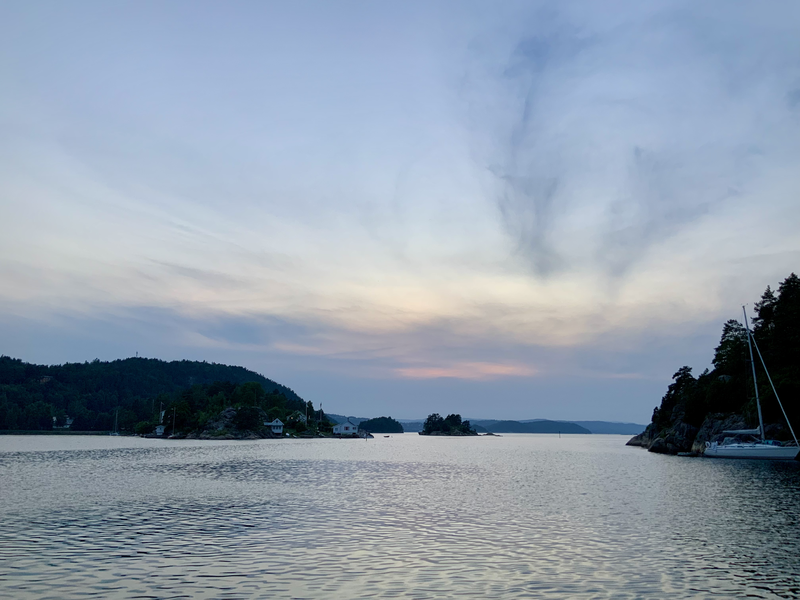Setting up a hydrophone array in an experimental mesocosm. Photo credit: Annika Lie
JOIN
My research group includes students and researchers at various levels across several institutions and disciplines, including ecology, evolutionary biology, ethology, genomics, bioinformatics, computer science, applied mathematics, socio-ecology, and the arts. Teamwork and collaboration are fundamental to our interdisciplinary research program. Practically, this often means co-supervision by researchers with different expertise and co-authorship on papers from the group as appropriate. The transatlantic nature of the lab enables both online and in-person interactions with diverse research environments and provides access to a wide range of facilities, funding opportunities, and experiences (more on this at the bottom of the page).
If you are a prospective student or postdoc with overlapping research interests and would like to learn more about joining the lab, please read on for how to do so. Interested collaborators should feel free to reach out by email with a brief description of interests.
If you are a prospective student or postdoc with overlapping research interests and would like to learn more about joining the lab, please read on for how to do so. Interested collaborators should feel free to reach out by email with a brief description of interests.
MENTORING PHILOSOPHY
My role as a mentor is to provide a safe, supportive, stimulating, and inclusive research environment. Every mentee is different, and I aim to empower each one to pursue research that excites them while supporting them to thrive in all aspects of their life. For students, I support a study plan tailored to their unique interests and career goals, whether academic, government, non-profit, or industry oriented. This includes training in diverse soft skills, such as communication and organization. For advanced PhDs and postdocs, I facilitate their journey to independent research and support them in their transition to a leadership position. No matter the career stage, I aim to the provide context, feedback, and resources to develop their potential. A positive learning environment needs to account for not only a student’s professional development, but their humanity. Work-life balance, flexibility, and open and good communication are necessary (though not sufficient) to create a healthy and equitable work environment.
I encourage members of under-represented groups in science to reach out about joining the team. I am aware of challenges facing members of these groups, including members of the Black, Indigenous, visible minority, LGBTQIA2S+, disability, immigrant, and first-generation academic communities. I am committed to creating a diverse, equitable, and inclusive workplace.
I encourage members of under-represented groups in science to reach out about joining the team. I am aware of challenges facing members of these groups, including members of the Black, Indigenous, visible minority, LGBTQIA2S+, disability, immigrant, and first-generation academic communities. I am committed to creating a diverse, equitable, and inclusive workplace.
PROSPECTIVE GRADUATE STUDENTS

I recruit graduate students (MSc or PhD) through the Department of Biological Sciences at UNB Saint John. Graduate students are expected to learn how to carry out an independent research project that fits with the group's research interests. I'm looking for students who are curious, take initiative, and who will contribute to a positive and collaborative lab and department environment.
The fully-funded MSc and PhD positions at UNB for 24/25 depicted in the advertisement below have been filled. I am still open to applicants interested in co-developing NSERC scholarship proposals in these and related areas.
Fully funded MSc and PhD positions associated with specific projects are advertised here as available, but prospective students should reach out about available funding and fellowship opportunities. Graduate students are typically funded through a combination of Graduate Student Teaching Assistantships (GSTAs) and Graduate Research Assistantships (GRAs). UNBSJ offers a wide variety of internal and external scholarship opportunities depending on individual circumstances and eligibility. All graduate students without own funding are expected to apply for NSERC graduate fellowships and top-ups will be provided to successful applicants. Note that only domestic students are eligible for masters scholarships. Doctoral students should also consider applying for the Vanier Canada Graduate Scholarship. Interested applicants should reach out well in advance of the research council deadlines in order for me to support the development of your application.
See here for information about the biology graduate program at UNBSJ and how to apply. Note that you should not apply until you have made an agreement with a potential supervisor. The program is open to both domestic and international students, but international students are recommended to apply at least 6 months in advance of the proposed start date. Graduate student employment is governed by the collective agreement between UNB and the Public Service Alliance of Canada local 60550, Union of Graduate Student Workers (UGSW).
Sometimes I recruit masters students through the Masters in Coastal Ecology programme at the University of Agder. These opportunities will be advertised here when available but interested students are welcome to get in touch.
If you are interested in joining the group as a graduate student, please email me at rebekah.oomen(at)unb.ca with brief answers (1-3 sentences) to the following, along with your resume/CV and unofficial transcripts or a list of university courses completed and indications of which courses you particularly enjoyed or excelled at. The information on my website and the answers to these questions are meant to serve as a starting point for discussing our mutual fit.
Here are some additional resources on how to choose a grad program, how to choose an advisor, advice on applying to grad school in ecology and evolutionary biology, and how to write an inquiry email to a potential advisor.
The fully-funded MSc and PhD positions at UNB for 24/25 depicted in the advertisement below have been filled. I am still open to applicants interested in co-developing NSERC scholarship proposals in these and related areas.
Fully funded MSc and PhD positions associated with specific projects are advertised here as available, but prospective students should reach out about available funding and fellowship opportunities. Graduate students are typically funded through a combination of Graduate Student Teaching Assistantships (GSTAs) and Graduate Research Assistantships (GRAs). UNBSJ offers a wide variety of internal and external scholarship opportunities depending on individual circumstances and eligibility. All graduate students without own funding are expected to apply for NSERC graduate fellowships and top-ups will be provided to successful applicants. Note that only domestic students are eligible for masters scholarships. Doctoral students should also consider applying for the Vanier Canada Graduate Scholarship. Interested applicants should reach out well in advance of the research council deadlines in order for me to support the development of your application.
See here for information about the biology graduate program at UNBSJ and how to apply. Note that you should not apply until you have made an agreement with a potential supervisor. The program is open to both domestic and international students, but international students are recommended to apply at least 6 months in advance of the proposed start date. Graduate student employment is governed by the collective agreement between UNB and the Public Service Alliance of Canada local 60550, Union of Graduate Student Workers (UGSW).
Sometimes I recruit masters students through the Masters in Coastal Ecology programme at the University of Agder. These opportunities will be advertised here when available but interested students are welcome to get in touch.
If you are interested in joining the group as a graduate student, please email me at rebekah.oomen(at)unb.ca with brief answers (1-3 sentences) to the following, along with your resume/CV and unofficial transcripts or a list of university courses completed and indications of which courses you particularly enjoyed or excelled at. The information on my website and the answers to these questions are meant to serve as a starting point for discussing our mutual fit.
- Why are you interested in pursuing graduate research?
- Why are you interested in joining this research group in particular?
- What are your most relevant experiences for the kinds of research you are interested in? This may include experience from studies, work, or hobbies.
- What skills would you like to learn?
- What might you like to do after graduate school?
Here are some additional resources on how to choose a grad program, how to choose an advisor, advice on applying to grad school in ecology and evolutionary biology, and how to write an inquiry email to a potential advisor.
PROSPECTIVE UNDERGRADUATE STUDENTS
Undergraduates from the Department of Biological Sciences at UNB Saint John can join the lab as an Honours thesis student for course credit and/or a NSERC Undergraduate Student Research Award (USRA) holder, which is a paid position (minimum $7200 for 4 months in the summer). Undergraduates are expected to carry out an independent project usually connected to ongoing work in the lab, under the supervision of myself and graduate students. Prospective Honours students should reach out no later than the spring before the academic year in which they plan to complete their thesis (i.e. typically in the third year of studies) or the autumn if they wish to jumpstart their research with a summer USRA. USRAs are awarded through a competitive application process with a January deadline and summer employment. I'm happy to co-develop and support USRA applications (regardless of Honours thesis plans) if contacted in good time (e.g. a couple of months) before the deadline. Additional funded opportunities (e.g. part-time lab manager) will be advertised here as available.
If you are interested in joining the group as an undergraduate, please email me at rebekah.oomen(at)unb.ca with brief answers (1-3 sentences) to the following, along with your resume/CV and unofficial transcripts. The information on my website and the answers to these questions are meant to serve as a starting point for discussing our mutual fit.
If you are interested in joining the group as an undergraduate, please email me at rebekah.oomen(at)unb.ca with brief answers (1-3 sentences) to the following, along with your resume/CV and unofficial transcripts. The information on my website and the answers to these questions are meant to serve as a starting point for discussing our mutual fit.
- Why are you interested in research?
- Why are you interested in joining this research group in particular?
- What are your most relevant experiences for the kinds of research you are interested in? This may include experience from studies, work, or hobbies (no previous research experience required).
- What skills would you like to learn and outcomes (e.g. data set, paper, software) would you like to produce?
PROSPECTIVE POSTDOCS
Fully funded postdoc positions are advertised as available, but I'm always happy to hear from researchers interested in collaborating towards potential fellowship opportunities. Please email me at rebekah.oomen(at)unb.ca to discuss. Here are some possible options:
- Natural Sciences and Engineering Research Council of Canada (NSERC) Postdoctoral Fellowships - $45,000 per year for 2 years. You must be a Canadian citizen, a permanent resident of Canada or a protected person under subsection 95(2) of the Immigration and Refugee Protection Act (Canada). Can be hosted at the University of New Brunswick, the University of Gothenburg, or the University of Agder, however it is difficult to take abroad due to the low level of funding. October deadline.
- Mitacs Elevate Postdoctoral Fellowships - $60,000 per year for 1-2 years. No citizenship requirements. Must be based in Canada and co-hosted/funded by a non-academic partner organization. Rolling deadline.
- Banting Postdoctoral Fellowships - $70,000 per year for 2 years. No citizenship requirements. Must be based in Canada. September deadline.
- Liber Ero Fellows - $70,000 per year for 2 years + $15,000 per year for travel/research. No citizenship requirements. Must be based in Canada and hosted jointly by an academic institution and a conservation organization. November deadline.
- Marie Skłodowska-Curie Actions Postdoctoral Fellowships - Two types, supporting mobility of researchers of any nationality within/into Europe (European Fellows) or researchers from Europe moving abroad (Global Fellows). September deadline.
- Funding for independent postdoc fellowships in biology spreadsheet (by Dieter Lukas) - Various amounts, durations, eligibility criteria, and deadlines. You might get lucky and find a good fit!
the environmentS
Opportunities exist for experimental and field work on both sides of the North Atlantic, particularly in the Maritimes and the Skagerrak/Kattegat seas. New Brunswick, southwestern Sweden, and southern Norway have a diverse range of marine and estuarine/fjord habitats along with perfectly situated marine biological stations.
The University of New Brunswick Saint John is co-located with the Canadian Rivers Institute which houses my research group's two aquatic (saltwater/freshwater) laboratories in addition to shared spaces. We also have a dedicated genetics laboratory and access to larger molecular infrastructure next door. The nearby Huntsman Marine Sciences Centre provides opportunities for field and experimental (e.g. breeding/quantitative genetics) collaborations, as does the proximity of the Department of Fisheries and Oceans at St. Andrew's Biological Station. The Department of Biological Sciences at UNB Saint John is a collegial, dynamic, and research-intensive group with an emphasis on marine biology. Saint John is a vibrant port city with a historical core, great nightlife and restaurants, and easy access to a variety of outdoor activities.
The University of Gothenburg's Tjärnö Marine Laboratory is located on the western coast of Sweden ~1.5 hours drive south of Oslo and ~2 hours north of Gothenburg. It has state-of-the-art shared aquatic laboratories and molecular lab facilities, research vessels, and a dynamic community of ~70 full-time researchers and staff in addition to visiting students and researchers that take advantage of the affordable dormitories (and sauna). Tjärnö is located on the biodiverse Bohuslän coast next to Kosterhavet National Park with a unique cold-water coral reef.
The University of Agder's Centre for Coastal Research is mainly based in Kristiansand, Norway but also distributed across the Grimstad campus, and the Institute of Marine Research's Flødevigen Research Station, among others. I've collaborated with Flødevigen since 2011. It has excellent flow-through saltwater labs, large artificial ponds/mesocosms, a genetics lab, and easy access to the heterogeneous Norwegian coastline. Around 60 full-time staff and many more visiting researchers using the "guest house" are active in all areas of applied marine research and management.
The University of New Brunswick Saint John is co-located with the Canadian Rivers Institute which houses my research group's two aquatic (saltwater/freshwater) laboratories in addition to shared spaces. We also have a dedicated genetics laboratory and access to larger molecular infrastructure next door. The nearby Huntsman Marine Sciences Centre provides opportunities for field and experimental (e.g. breeding/quantitative genetics) collaborations, as does the proximity of the Department of Fisheries and Oceans at St. Andrew's Biological Station. The Department of Biological Sciences at UNB Saint John is a collegial, dynamic, and research-intensive group with an emphasis on marine biology. Saint John is a vibrant port city with a historical core, great nightlife and restaurants, and easy access to a variety of outdoor activities.
The University of Gothenburg's Tjärnö Marine Laboratory is located on the western coast of Sweden ~1.5 hours drive south of Oslo and ~2 hours north of Gothenburg. It has state-of-the-art shared aquatic laboratories and molecular lab facilities, research vessels, and a dynamic community of ~70 full-time researchers and staff in addition to visiting students and researchers that take advantage of the affordable dormitories (and sauna). Tjärnö is located on the biodiverse Bohuslän coast next to Kosterhavet National Park with a unique cold-water coral reef.
The University of Agder's Centre for Coastal Research is mainly based in Kristiansand, Norway but also distributed across the Grimstad campus, and the Institute of Marine Research's Flødevigen Research Station, among others. I've collaborated with Flødevigen since 2011. It has excellent flow-through saltwater labs, large artificial ponds/mesocosms, a genetics lab, and easy access to the heterogeneous Norwegian coastline. Around 60 full-time staff and many more visiting researchers using the "guest house" are active in all areas of applied marine research and management.
We respectfully acknowledge that UNB stands on the unsurrendered and unceded traditional Wolastoqey (WOOL-US-TOOK-WAY) land. The lands of Wabanaki (WAH-BAH-NAH-KEE) people are recognized in a series of Peace and Friendship Treaties to establish an ongoing relationship of peace, friendship and mutual respect between equal nations. The river that connects our two campuses is known as Wolastoq (WOOL-LUSS-TOOK), along which live Wolastoqiyik (WOOL-US-TOO-GWEEG) – the people of the beautiful and bountiful river. Wolastoq (WOOL-LUSS-TOOK) is also called the St. John River.
All photos are mine unless otherwise specified. This site is optimized for desktop/tablet, so strange things can happen on a mobile/tablet.
All photos are mine unless otherwise specified. This site is optimized for desktop/tablet, so strange things can happen on a mobile/tablet.


